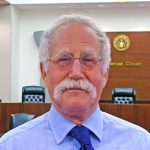Officer’s motion to dismiss traffic charges against himself is denied

Govendo
Superior Court Associate Judge Kenneth L. Govendo has denied police officer Dixon Kwon’s motion to dismiss several traffic charges filed against him over a 2017 car crash on As Gonno Highway that resulted in serious injuries to his then-girlfriend, who was his passenger.
In an order yesterday, Govendo also ruled that the Department of Public Safety acted in bad faith when police officer Olympio Muna lost the internal investigation case file and police officer Alexander Sakisat discarded the audio records, because the finding’s potential exculpatory value was apparent at the time they were lost or destroyed.
However, Govendo said, Kwon can obtain comparable evidence by other reasonably available means.
Exculpatory evidence refers to evidence favorable to the defendant in a criminal case that tends to exonerate the defendant of guilt.
The judge said to warrant dismissal, lost or destroyed evidence “must be of such a nature that the defendant would be unable to obtain comparable evidence by other reasonably available means.”
Govendo disagreed with Kwon’s argument that he would be unable to obtain comparable evidence because everything from the investigation is lost or destroyed, and a cross-examination of the officers would not recreate the DPS Internal Affairs Unit’s investigation or the favorable findings.
Govendo said Kwon declares but does not explain how a cross-examination could not produce favorable findings.
The judge said Kwon could use the internal investigation’s findings to impeach the officers, to question the breathalyzer results, and to suppress any statements he made.
Govendo said that Muna had testified that he discovered inconsistent information whether police officer Melvin Cadigan properly read Kwon his Miranda rights.
Miranda refers to the U.S. Supreme Court’s landmark ruling that concludes that statements made by a suspect in police custody are generally inadmissible if the suspect has not been made aware of his or her Fifth and Sixth Amendment rights.
Govendo said Sakisat testified that police officer Peter Aldan declared that Kwon signed a form refusing to acknowledge his constitutional rights, even though Kwon had not signed the form.
“Nothing prevents Dixon Kwon from cross-examining officers Muna, Sakisat, Aldan, and Cadigan about these inconsistencies,” the judge pointed out.
Furthermore, he said, any statements in violation of a defendant’s Miranda rights can be suppressed.
“The court therefore finds that even though Dixon Kwon may be unable to recreate the internal investigation, he can obtain comparable evidence through other reasonably available means,” Govendo said.
Police said Kwon was driving on July 22, 2017, when his vehicle ran off the road on As Gonno Highway and hit a tree, causing serious injuries to his passenger, Deedra Santos.
When the officers responded to the area, Kwon was reportedly not at the scene, but Santos was there. Kwon was an off-duty officer who was “driving under the influence” at the time of the accident.
Kwon was arrested and subsequently charged with driving while under the influence of alcohol, with a blood alcohol concentration of 0.08 percent or more, DUI, two counts of fleeing the scene of an accident, reckless driving causing bodily injury, failure to have motor vehicle liability insurance while operating a vehicle on a public highway, and failure to have motor vehicle liability insurance in possession while operating a vehicle on a public highway.
Kwon is still employed with DPS.
Last March 12, Govendo ordered the government to provide Kwon with any favorable evidence derived from the DPS internal investigation of police conduct during Kwon’s arrest.
Specifically, Govendo ordered the government to provide Kwon with the DPS Internal Affairs Unit’s reports/notes and audio recordings from its investigation into police misconduct.
Six days after the judge’s order, the Commonwealth informed the court that DPS diligently searched for the materials but did not find them because Muna lost the notes/reports and Sakisat discarded the interview audio recordings. As a result, Kwon, through counsel Charity R. Hodson, moved to dismiss the charges against him.
Govendo heard Kwon’s motion to dismiss last Nov. 29. Assistant attorney general Jonathan Robert Glass Jr., counsel for the government, opposed the motion.
Kwon asked the court to dismiss this case because the Commonwealth failed to produce the notes/reports and audio recordings from DPS’ internal investigation, and because the court found in its previous order that those notes/reports and recordings favored him.
In the order yesterday denying Kwon’s motion to dismiss, Govendo said if the lost or destroyed evidence is only “potentially useful evidence,” failure to preserve it does not violate due process “unless a criminal defendant can show bad faith on the part of the police.”
In this case, the judge said, DPS lost or destroyed potentially useful evidence, so Kwon must show that DPS acted in bad faith in failing to preserve the evidence and that the exculpatory value of the evidence was apparent before its destruction.
Govendo said Kwon must also show that the nature of the evidence was such that Kwon would be unable to obtain comparable evidence by other reasonably available means.























